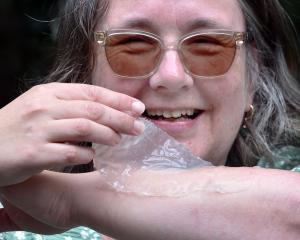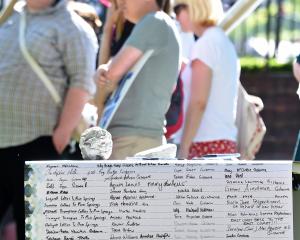
Dunedin Hospital's sole neurosurgeon, Ahmad Taha, has worked without local assistance or locum cover for much of the past few months.
The report, commissioned by the South Island Alliance Leadership Team, said inadequate neurosurgery staffing levels were nothing new for Dunedin.
The service had not been staffed with its intended roster of three doctors at any time in the past nine years.
''The review team is concerned that provision of a 24/7/365 service for an open-ended period until a third neurosurgeon is appointed, and arrives, is inherently unsafe,'' the report said.
''The past history is a litany of unfulfilled expectations and early departures ... The team is not confident that the staffing structure is any more durable than at any time in the previous three triennia.''
South Island Neurosurgery Service chairman Chris Fleming said yesterday a short-term locum surgeon would finish a series of clinics on Friday.
''No other locums are available at the moment,'' Mr Fleming said.
He was not aware of any appointments in the near future.
The report said a third clinician had been offered a position, but that was rescinded after they were unable to be registered in New Zealand.
The report panel was chaired by Auckland surgeon Ian Civil and included Scottish neurosurgeon Jennifer Brown, Auckland nurse unit manager Denise Le Lievre and South Island Alliance programme manager Janice Donaldson.
Its report pulled no punches, pointing out hardly any of the recommendations from a 2010 review of neurological services - which established a model where one neurosurgery service was provided from sites in Christchurch and Dunedin - were fully implemented.
It paints a picture of a service which has struggled to provide adequate neurosurgery services in Dunedin, and which has major ongoing issues attracting staff to live and work in the city.
''The service has never functioned, or been funded, managed, or staffed on a 'one service, two sites' basis,'' the report said.
''Supportive links between clinical staff in surgery, nursing and allied health and technical services are rudimentary at best ... rather than a single service delivered on two sites, as recommended by the expert panel report, we saw two small units with competing interests and witnessed evidence of a relationship marked by mistrust.''
Mr Fleming said he was confident the service could be turned around.
''But we have to get a sustainable workforce, which is the right mix of people on the ground here and continuing to work as a region,'' he said.
''We are working very actively with Canterbury at the moment, around making sure we provide a safe environment for both patients and clinicians, especially Mr Taha, but we need to make that last beyond the short-term crisis of challenge of workforce.''
The service accepted almost all of the report's recommendations, but rejected a call for the University of Otago to no longer play a role in appointments to the services.
''If we uncoupled clinical service provision from the academic side of neurosurgery, it would not be viable to have a service,'' Mr Fleming said.
''It's not so much about the workload, it's about the regularity of being on-call ... you need to have enough people on the roster so there is a workable call arrangement and that the work-life balance for our workforce is sustained.''











